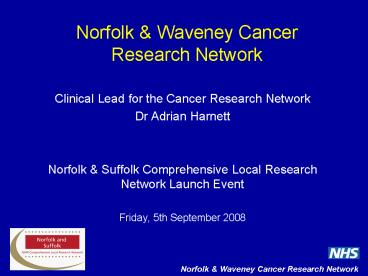Norfolk - PowerPoint PPT Presentation
1 / 14
Title:
Norfolk
Description:
Suzanne Penny (breast; urology) Karen Heasley (lung; gynae; head & neck) Sharon Walton (upper GI; sarcoma; urology) Clinical research Nurse: Melissa Cambell-Kelly ... – PowerPoint PPT presentation
Number of Views:134
Avg rating:3.0/5.0
Title: Norfolk
1
Norfolk Waveney Cancer Research Network
- Clinical Lead for the Cancer Research Network
- Dr Adrian Harnett
- Norfolk Suffolk Comprehensive Local Research
Network Launch Event - Friday, 5th September 2008
2
What can the CLRN learn from other UKCRN Local
networks in Norfolk Suffolk?
3
National Cancer Research Network (NCRN)
- Comprises 33 Cancer Research Networks in England,
originally mapping onto Cancer Service Networks - Provide funding for infrastructure to support
high quality research studies - Performance management role to ensure funding
used appropriately
4
National Cancer Research Network (NCRN)
- NCRN was launched in April 2001 with the
intention to - Improve patient care
- Improve co-ordination and speed of research
- Maintain and enhance the quality of research
- Improve integration and participation in research
- Accrual
- Baseline 2001-2 3.75 of incident cases
- Target set 7.5 of incident cases
- Target met 2003-4 10.9 of incident cases
5
Norfolk Waveney CRNOrganisation and
characteristics
Norfolk Waveney Population 700,000 Norfolk
(except West Norfolk) North Suffolk
6
Our aims
- To embed participation in research into standard
management of patients with cancer - Developing local portfolio of studies through
cancer Site Specific Groups (SSGs) - Ensuring balanced portfolio of research studies
- Active management of accrual research studies
- Support to multidisciplinary teams (MDTs) to
recruit and manage patients on clinical research
studies - Expertise in developing effective patient
recruitment strategies - (screening logs)
7
Norfolk Waveney Cancer Research Network (NWCRN)
- 1. Where we started from
- Established April 2002 as part of National Cancer
Research Network (NCRN) - Numbers of staff - 1
- Covers Norfolk Norwich University Hospitals NHS
Foundation Trust and James Paget University
Hospitals NHS Foundation Trust - Baseline recruitment to high quality cancer
research studies was 2.3 of incidence (31 / 34
nationally) - National targets for recruitment of patients to
NCRN studies increased - Maintain 10.0 overall
- Reach 7.5 into randomised studies
8
Norfolk Waveney Cancer Research Network (NWCRN)
- Clinical Lead for Research Dr Adrian Harnett
- Research Network Manager Dr Jane Beety
- Clinical Trials Practitioners Kit Holland
(brain colorectal) - Cheryl Websdale (haematology
lymphoma) - Suzanne Penny (breast urology)
- Karen Heasley (lung gynae head
neck) - Sharon Walton (upper GI sarcoma
urology) - Clinical research Nurse Melissa
Cambell-Kelly - Lead Radiographer Sarah Hills
- Data Quality Specialist Katrien Oosterom
- Administrative Assistants Lucy Nobes, Helen
Darby
9
NWCRN accrual
2. Where we are
11.5
11.0
10.7
9.6
8.2
2.3
10
2. Where we are
- Research culture part of standard care
- Widened the participation of SSGs in research
studies - Increased the number of clinicians recruiting
patients to national studies - Ensuring balanced portfolio of research studies
- Quadrupled numbers of cancer patients entering
national studies since 2001 - National reputation and recognition for NNUH,
JPUH and NWCRN for cancer research activities
11
The challenges
- Staff appointed, inducted and trained
- Education of Clinical Teams (research embedded in
standard of care rather than optional extra) - Engagement with them
- Balanced portfolio, spread of studies
- Realistic recruitment
- Opening studies / completing applications (time
consuming and costly - clinicians need a lot of
help!) - Agree level of support
- Funding
12
3. Where we are going
- Maintaining 10 overall accrual to NCRN studies
- Increasing RCT accrual to 6.5 (NCRN studies)
- Chemotherapy issues JPUH and capacity NNUH
- Radiotherapy capacity NNUH
- Pharmacy capacity NNUH
- Radiology capacity NNUH and JPUH
- Expansion of senior medical staff
- Maintaining highest quality data whilst
increasing accrual - Follow-up appointments for research studies
13
NWCRN future plans and challenges
- Increase number of cancer patients recruited to
national RCTs - Expand cancer research portfolio and prioritise
studies - Links with NCRN Industry studies
- Increasing use of CRTU to support NWCRN studies
- SSG Research Clinical Trials plans
- Greater attention to rarer tumours
14
So what can the CLRN learn?
- What patients should go into clinical trials?
- What patients should not go into clinical trials?
- What is the most important factor for success of
the CLRN?































